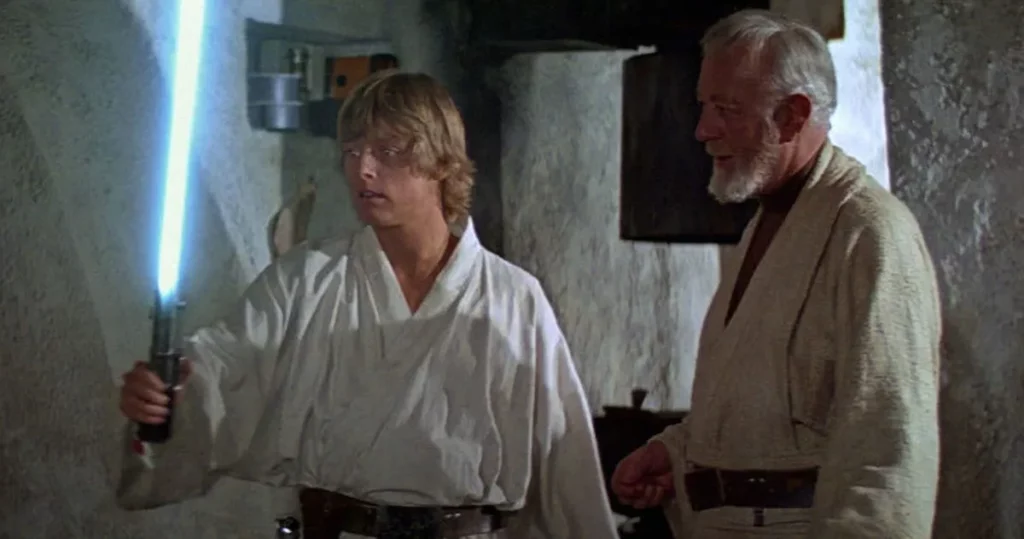The Influence Character is one of the most important roles in your character cast. It is third only to the protagonist and antagonist. The term “Influence Character” originates from Dramatica Theory, and has since been used and adopted (and sometimes adapted) by others in the writing community. This is a role that has power based on impact–impact on other characters, impact on plot, and impact on theme. When you understand the principles behind the Influence Character, you can use them to strengthen any story.
The Influence Character Impacts the Protagonist

The Influence Character’s power comes from impacting others, specifically the protagonist. Most commonly, the Influence Character helps persuade the protagonist to confront her flaws, weaknesses, and misbeliefs, so she can complete her character arc.
For example, in The Greatest Showman, P. T. Barnum is the protagonist and his wife, Charity, is the Influence Character. Throughout the film, Charity works to persuade P. T. that what he already has in life is enough and that he only really needs his closest loved ones to accept him. When she leaves, he must confront his biggest failures and make things right, completing his arc.
In Star Wars: A New Hope, Luke is the protagonist and Obi-Wan is the Influence Character. Obi-Wan introduces Luke to the Force and aims to persuade him to trust it. It’s because of Obi-Wan’s influence that Luke chooses to listen to the Force at the climax. He turns off technology, and makes the winning shot to destroy the Death Star by trusting the Force.
Worth noting, is that one variation of this, is the reverse. Sometimes the protagonist helps the Influence Character to confront his flaws, weaknesses, and misbeliefs to complete his character arc (in which case, it may be helpful to think of the Influence Character as the Influenced Character).
For example, in The X-Files, Mulder is the protagonist and Scully is the Influence(d) Character. Mulder’s journey and dedication impact Scully, by forcing her to confront her misbeliefs, until eventually she comes to believe in the paranormal, government conspiracy, and alien abduction.
Likewise, in Moana, Moana influences Maui, by helping him learn that who he is, is not what others praise him for (nor his hook). Who he is, comes from inside himself.
The protagonist and Influence Character have a special relationship in the story—in fact, it usually makes up the central relationship plotline of the story. Most frequently, these two characters will draw closer to each other by the end. Common relationship roles for the Influence Character are mentor, love interest, best friend, family member, coworker, or partner.
It’s helpful to give the Influence Character traits that contrast and challenge the protagonist. Choose traits that will naturally bring out what you want or need to emphasize about your protagonist. To emphasize Mulder’s beliefs in the outlandish, he’s paired with Scully, a major skeptic. To emphasize how P.T. is always looking for more (and more acceptance), he’s paired with Charity, who is easily satisfied by being accepted by loved ones.
The Influence Character Impacts the Plot

Since the protagonist and Influence Character are somehow linked (in a relationship), typically they will be on the same course and/or have similar goals. The protagonist and Influence Character are usually tied together in the external plot. Most commonly, the two must work together to resolve the main conflict. For example, in The Lord of the Rings, Frodo needs Sam to make it to Mount Doom. In Zootopia, Judy needs Nick to solve the case.
A variation is that the characters may be on separate, but similar journeys. In Legally Blonde, both Elle and Paulette want their dogs, and love, in their lives, and both are having trouble with their exes.
What’s often different with these two characters, though, is the way they address the goal or journey. Frodo wants to trust Smeagol to take them to their destination. Sam wants to be rid of him. Elle faces her problems with a strong belief in herself, while Paulette comes from a place of insecurity. Mulder wants to turn to the paranormal for explanation, and Scully wants to turn to hard science.
These differences can lead to arguments, power struggles, or complications, which often contribute to significant conflict in the relationship plotline, external plotline, or even internal plotline. The argument over Smeagol drives Frodo and Sam apart just before Shelob’s Lair. And therefore, it also jeopardizes the goal of the main plotline (making it to Mount Doom to destroy the Ring). The arguments and complications between Judy and Nick, lead to Judy’s internal struggles and turmoil.
The Influence Character Impacts the Theme

Usually the reason the Influence Character has different methods, is because he has a different worldview. This worldview will often tap into theme.
In fact, perhaps at the most basic level, the Influence Character typically works as a thematic opponent for the protagonist.
The thematic statement of Star Wars: A New Hope, is that we should trust in faith (over technology). Through the film, Obi-Wan voices and illustrates the thematic statement, which Luke eventually converts to by the end. Prior to this, though, Luke is resistant, at one point asking, how he can properly fight, if he can’t see (to which Obi-Wan responds, he must trust the Force).
In Moana, the thematic statement is that your identity comes from who you are on the inside. Deep down, Moana knows this to be true, and follows her inner calling. In contrast, Maui believes his identity is based on how others perceive him—first his parents abandon him over his appearance, and then he seeks the praise of humankind (which he can only receive if he has his hook). It’s these differing views on the theme topic (identity) that lead them to argue about what to do.
Likewise, in Marley and Me, the thematic statement is that we should embrace the adventures of domestic life. Marley, a dog (and the Influence Character), does this better than anyone. But this worldview is different than John’s (the protagonist), who sees the unpredictability of domestic life as a burden to his career. The theme topic is domestic life, and the two characters have opposing perspectives about it.
This set up allows the audience to explore different perspectives related to the theme topic, and the impact those perspective have when applied to “real life” (the characters’ “real life”). The audience is better able to see how different approaches to problems lead to different consequences.
Variations to Consider

This article is just an introduction to the Influence Character and is not comprehensive. There are plenty of variations you can play with, in regard to this role. For example . . .
While usually the Influence Character works as an ally, it’s possible for the Influence Character to be a rival or even the main antagonist. This is the case in Death Note, as well as in the film, Glass.
While the Influence Character may be one character, it’s also possible multiple characters step into and out of this role. In Hamilton, both Eliza and George Washington act as Influence Characters for Hamilton (though never at the same time).
While the Influence Character is usually the other key player in the relationship plotline, he doesn’t have to be. In Harry Potter and the Sorcerer’s Stone, Hagrid and Dumbledore work as Influence Characters, but the relationship plotline is about Harry, Ron, and Hermione.
This article just shares some principles to guide you. Once you understand them, you can manipulate them more for different effects.
If you are interested in learning more about the Influence Character, particularly in relation to the character cast, plot, and theme of your own story, we’ll be digging deeper into the concept in my upcoming class, The Triarchy Method of Story. Follow the link to learn more.
About September C. Fawkes:
Sometimes September C. Fawkes scares people with her enthusiasm for writing and storytelling. She has worked in the fiction-writing industry for over ten years and has edited for both award-winning and best-selling authors, as well as beginning writers. She runs a writing tip blog at SeptemberCFawkes.com and will be teaching an upcoming class, The Triarchy Method of Story. When not editing and instructing, she’s penning her own stories. Some may say she needs to get a social life. It’d be easier if her fictional one wasn’t so interesting.
***
Apex Glimpses, News, & Shout-outs!
The Michael Hauge poll is closed and the winning presentation is: HOW TO SEDUCE YOUR READER IN THE FIRST 10 PAGES!”
- The opening of your screenplay or novel is your single most powerful weapon for acquiring an agent or securing a deal. Using examples from recent successful films and novels, Michael reveals the secrets of transforming your opening scenes into emotionally gripping sequences that will force readers to turn the page.
Remember to mark your calendars for Monday, February 27, 2023 at 7 pm MT (9 pm ET).
MICHAEL HAUGE is a script consultant, story expert, author and lecturer who works with writers, filmmakers, marketers, business leaders, attorneys and public speakers, both in Hollywood and around the world. He has consulted on projects starring Morgan Freeman, Julia Roberts, Tom Cruise and Reese Witherspoon, and for Overbrook Entertainment, where he consulted on the scripts for (among many others) I AM LEGEND, HANCOCK, THE KARATE KID, SUICIDE SQUAD and BRIGHT, which is currently in production.
Michael is the best selling author of Selling Your Story in 60 Seconds: The Guaranteed Way to Get Your Screenplay or Novel Read, as well as the 20th Anniversary Edition of his classic book Writing Screenplays That Sell. His latest book, Storytelling Made Easy: Persuade and Transform Your Audiences, Buyers and Clients ! Simply, Quickly and Profitably became an Amazon best seller within 3 days of its release. And he has presented seminars, lectures and keynotes in person and online to more than 500,000 participants worldwide. According to Will Smith, “No one is better than Michael Hauge at finding what is most authentic in every moment of a story.
For information on Michael coaching and consulting services, his lectures, workshops and keynotes, and his books and products, as well as an abundance of free articles and videos, please visit www.StoryMastery.com.
Remember! Check out our NEW course from MyStoryDoctor.com! The Triarchy Method of Story by September C. Fawkes.
Craft your best book by focusing on what matters most: The “bones” of story.
This content-focused course will help you:
- Brainstorm better and more relevant material
- Evaluate what ideas most belong in your story (preventing you from writing hundreds of pages that need to be scrapped), and
- Craft a page-turning plot with compelling characters that sticks with readers long after they’ve closed the book (. . . and hopefully leads them to preorder your next book).
- And more
This live, online class is limited to 10 students. Classes start March 7 and run Tuesdays and Thursdays at 6:30 pm Mountain Time (8:30pm EST) for a total of 23 classes. Classes ends on May 25.
For more information, visit https://mystorydoctor.com/the-triarchy-method-of-story/
About the Instructor

September C. Fawkes has worked in the fiction-writing industry for over ten years and has been editing stories for longer. She has edited for both award-winning and best-selling authors, as well as new writers. She has worked on manuscripts written for middle grade, young adult, and adult readers, and specializes in fantasy and science fiction.
For seven years, she worked through New York Times best-selling author David Farland, providing feedback on his workshop students’ assignments, editing their manuscripts, and sometimes, even editing David’s own books.
When not working, she is running an award-winning writing tip blog. She has also served as a writing coach on Writers Helping Writers and teaches at writing conferences. Some may say she needs to get a social life. It’d be easier if her fictional one wasn’t so interesting.
REPLAY UP FOR KEVIN J. ANDERSON’S PRESENTATION
- The REPLAY is available to all Apexers! This talk about Kickstarters and Kevin’s AMA (Ask Me Anything questions) was a fantastic “look-behind-the-curtain,” full of concrete information. A must-see for anyone thinking about doing their own kickstarter!
- Additionally, Kevin’s publishing house, Wordfire Press will be releasing a memorial anthology for our Master Storyteller David Farland, OF WIZARDS AND WOLVES: Tales of Transformation, later this month.
And, we have several stories by Apexers within these pages. Get your own copy.

This anthology supports the scholarship fund of the Superstars Writing Seminars, which Dave co-founded. Kevin shared some wonderful news. With the money raised to date, two David Farland scholarships were offered for this year’s Superstars!
Table of Contents
“Of Wizards and Wolves … and Dave” © 2023 WordFire, Inc.
“Magic Hands” © 2023 Storm Humbert
“Inspirational Theurgist” © 2023 N.V. Haskell
“An Abundance of Wizards” © 2023 Linda Maye Adams
“A Sprig of Wolfsbane” © 2023 Mary Pletsch
“To Mend or Rend” © 2023 Morgan J. Muir
“Last Call” © 2023 LishKohn Productions
“The Punstoppable Catfish Stanley” © 2023 Becca Lee Gardner
“Silver Sentinels” © 2023 Jen Bair
“The Immortal Dez’itny” © 2023 Jesse Sprague
“Red” © 2023 Lehua Parker, LLC (An early version of this story was published in Old Scratch and Howl Hoots: A Collection of Utah Horror. Edited by C.R. Langille and R.L. Weston [Griffin Publishers, 2015].)
“Which Wolf Will You Feed?” © 2023 Tanya Hales
“Wolfskin” © 2023 Brenda Carre
“Peace on the Argent” © 2023 JJ Lynn Daniels
“Twilight Bargain” © 2023 Sixth Moon Press LLC
“IF-Wolf” © 2023 Mike Jack Stoumbos
“The Journey Within”© 2023 William Joseph Roberts
“Of Wolves and Wives” © 2023 Melisa Todd
“Just Another Pinball Wizard” © 2023 Robert J. McCarter
“Barbarians” © 2013 David Farland
Handy Links
Want to share your newsletters, webpages and bookbubs with other Apexers?
Apexer Connections is now live.
If you would like to be added, click HERE and put in your info.
Or to change information on Apex connections, click HERE and put in your new information.
Graphics can also be added to make your “block” pop.
OTHER LINKS
The Course and Lecture Searchable

Searchable Index for Mastermind
📌 Shout-out to some of our Apexers for this week!
- To Samantha Edens – Her new book, Song of the Shadows, is now out and in the wild!
- To Diann Thornley Read – Her new book, The Seventh Shaman: Book Three, Crucible of the Gods, has been garnering some incredible reviews!
- And to Mike Jack Stoumbos – For his new novella release: A Man of His Word!
📌 If you have successes and news you’d like to share about yourself or another Apexer, please email Tammy and have “Apexer Good News” in the subject line. We’d love to do a shout-out!









